On the day after opening night of Everybody, the first show in Simon Godwin’s much-heralded first season as artistic director of Shakespeare Theatre Company, I visited him in his office to ask him questions about what conscience means to him personally and professionally.
The theme was partly prompted by Everybody, Branden Jacobs-Jenkins’s waggish remake of the medieval morality play Everyman, directed wittily by Will Davis. In it, the main character, a stand-in for all of humanity, is confronted by the allegorical figure Death and pressed to account for how they have lived. (That they is singular because in the playfully profound production now at the Lansburgh, any one of five actors might by lottery play the part, including one, Avi Roque, whose pronoun actually is they and whose performance in the role opening night blew me away.)
Although conscience is not an allegorical character in either Everyman or Everybody, it is implicitly always centerstage. Pricking our conscience is the whole point of the play. And so I began by asking Godwin about his own.
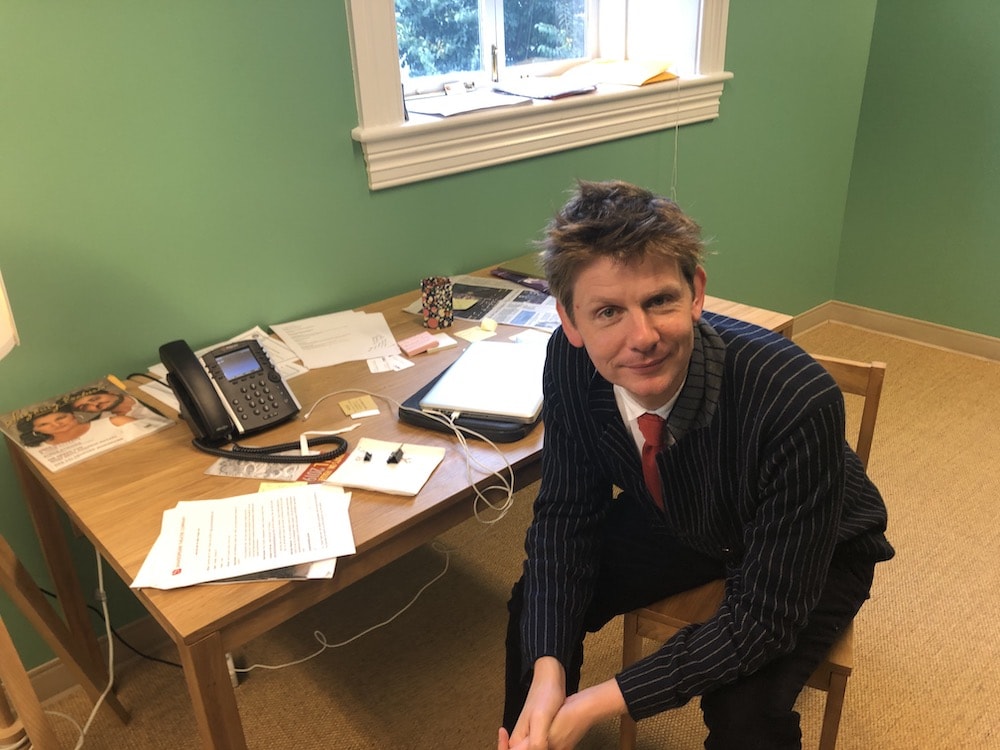
John: You seem someone whose conscience is like a software program that’s always running in the background and in the foreground when called for. But it’s always underneath your consciousness.
Simon: Yes, yes.
That’s not to say it never gets a glitch or never needs a reset.
Of course.
But its default mode is always on.
That’s what I aspire to. Definitely. The pilot light of conscience.
Coincidentally last night, the opening night of Everybody, it put conscience centerstage, without ever using the word.
That’s right. I’m glad you saw that. Yes. That’s awesome.
You’ve said that “in our atomized time, identity has become a political battleground,” but you seem to have very deeply thought about your own identity. For instance, you once said: “Feelings are not in opposition to being a man; feelings make the man.” Would you say more about what that means to you?
I enjoy art that celebrates emotional complexity and paradox. And the more at home we become with nuance, complexity, paradox, the better we function in the world. To reduce or to shut down or to judge takes us in one direction. In contrast, to open, to explore, to feel, these are not patriarchal values; they follow a different paradigm. The phrase from Hamlet comes to mind “speak feelingly” and, from the ending of King Lear, “The weight of this sad time we must obey / Speak what we feel, not what we ought to say.”
I have been given the opportunity to see whether I can embody these values—as a director, as an artistic director, as the leader of an organization, as the companion to an audience—and even, because of our prestige and privileged position here in Washington, in some way to a nation.
This comfort with feeling is what is supposed to be suppressed to be a man.
Yes.
To be a manager. To be a patriarch.
Yeah.
You’ve said everything that’s counter to that. Is that how you experience it too?
I gravitated to the arts, as many of us have, because they involve being part of an environment that offers alternative paradigms. Whenever I’ve tried to be a patriarch or a bossy male, it hasn’t worked for me. I don’t make good art. I don’t make people happy or motivated. If our aim is to create, lead, and generate energy, this rigidity is not useful. The stories that we treasure from Shakespeare, or even the Greeks, describe characters clinging onto a viewpoint and finally discovering that the world will beat them, that their own rigidity will destroy them. And this reminds me of a phrase of Peter Brook’s that I say at the beginning of every rehearsal process: “Hold on tightly, let go lightly.”
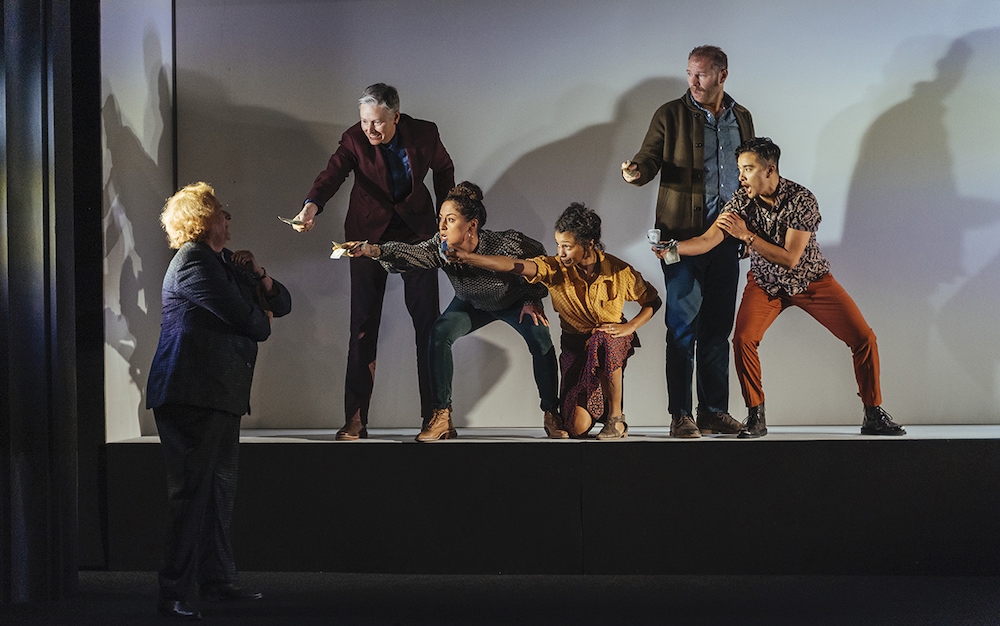
You’ve said that you are a feminist but you are “searching for how to be a better feminist—as an artist, as a director, as a man, every day.” How did you come to see yourself that way? And why does it matter to you?
Whenever somebody declares that they are a finished product or “I have successfully attained a level of wisdom or political sophistication,” I always feel skeptical because the moment we claim to know is the moment we know least. I’ve been taught by failure as much as success about how little I know, and how much more powerful the question is than the answer. As a young director, I realized after doing play after play that I’d had a very vibrant intellectual training at Cambridge, but I didn’t understand my own instincts. I wanted to find a new pathway to knowledge, inspiration, and playfulness.
Having an inkling of what was missing led me to leave my job at Northampton [at Royal and Derngate Theatres] and embark on two years of training in the Lecoq method of physical theater in London with a great teacher, Thomas Pratki. A lot of his work was around failure, which is the other very unpatriarchal thing to experience or allow. It was a very great safe space for two years to be away from everybody and undergo a series of experiences that were not about being successful. They were to do with understanding and experience, not about being “good.” When I emerged from the training, I was much more comfortable about encouraging actors to take bigger risks in rehearsal. It doesn’t matter if it goes wrong! The feeling of “Don’t make me do something I am bad at” compartmentalizes and restricts us.
You’ve been very open about your values. When you came to Shakespeare Theatre Company, you said of your first meeting here:
It was important I could say explicitly that I might look like a white male, and indeed might be a white male, but my wish and my work is striving to be beyond that and be open to all kinds of influences and people and collaborators and voices….
What I’ve got to do is demonstrate that my agenda is not the agenda that you might associate with a white middle-class male. That I can put my experience and my, if you like, privilege, at the feet of a new generation of artists, of all backgrounds.
How do those words feel to you five weeks into the job?
Well, look, John, we’re sitting together the day after my first production as artistic director opened. It’s no coincidence that production was called Everybody. It’s also the first time STC has ever produced a play by an African American dramatist. Change is urgently needed and it begins here.
Branden grew up in Washington and came to the Shakespeare Theatre Company as a child. He grew up with the classics, and is now very celebrated around the world. He renders the classical core texts through the lens of identity, race, sexuality, humor, gender, and grief.
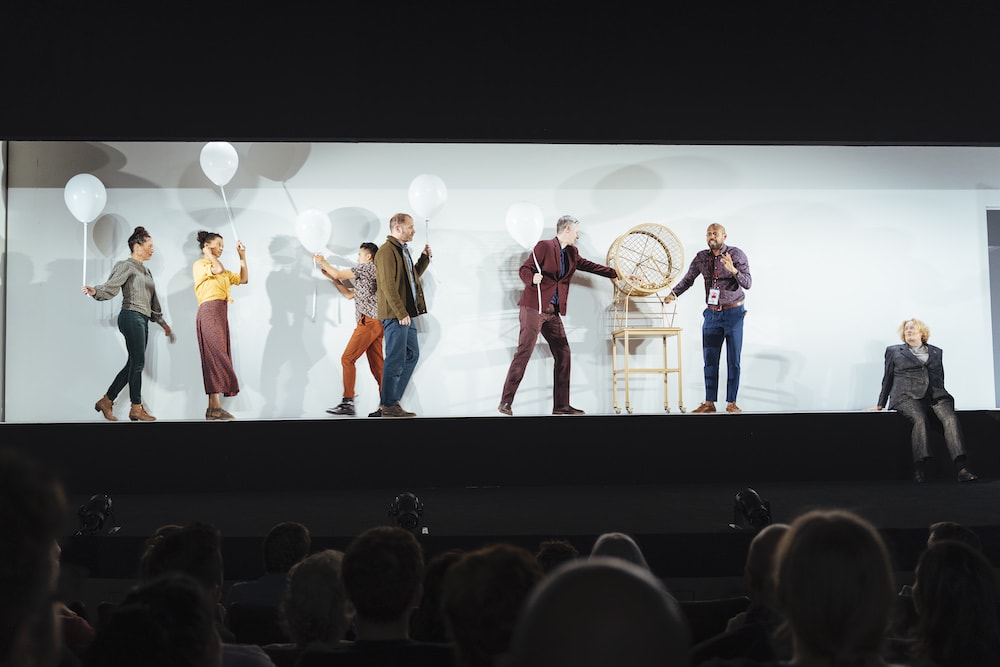
The night last February in the Harman when you introduced your first season, I was struck that the only white male playwright was going to be Shakespeare—Timon of Athens and Much Ado About Nothing, both to be directed by you—and I was impressed that your cross-race and cross-gender casting promised to be genuinely inclusive. I’d like you to talk about how your choices around these two plays reflect on your own conscience—and how the plays themselves speak to the theme of conscience in Shakespeare.
I immediately think of Hamlet’s “thus conscience doth make cowards of us all”—and the danger “of thinking too precisely on th’ event,” another phrase he uses—conscience, used in the wrong way, can paralyze us and become a source of terror. At the end of the play, Hamlet says, “If it be now, ’tis not to come; if it be not to come, it will be now; if it be it be not now, yet it will come—the readiness is all.” I can’t predict the future. I can’t know the future.
I can just be available to what’s in front of me. And that’s a key theme in Shakespeare: the notion that suffering humbles us and brings new knowledge. So Timon of Athens, who goes from being “happy” in the first half with lots of “friends,” discovers that these friends are not truly his friends. His life of privilege is replaced by a life of poverty. Then, in the second half of the play, he is given beautiful poetry to say about the human condition. And that is a very Greek idea: suffering bringing wisdom.
We also understand conscience as being a moral compass—intuition would be another word —a feeling that what we’re doing is right or wrong at any one moment. Shakespeare was interested in what it means to have many voices inside, to experience inner conflict. Characters articulate these voices through monologues, which are essentially a means of discovering what conscience is saying. And, as you rightly say, in Everyman, the original, and in Everybody, conscience is effectively a character.
Shakespeare saw Everyman, we think, as a child, and all those allegorical figures like Conscience or Friendship become renamed in his later work. I think of Buckingham in Richard III being Friendship. Or Vice—which is not in Everyman but is in the other medieval allegorical plays—becomes Richard III. He’s taking archetypes and naming them and making them characters. I’m sure there are characters in Shakespeare that you could say are modeled on Conscience, but essentially Hamlet is all those characters in one, and that’s why Hamlet is such an astonishing creation.
We have this word mindfulness now, which I think is a way of talking about conscience in everyday life—how being present makes space for conscience to come into our existence. The Empty Space is the title of Peter Brook’s extraordinary book. It’s such a radical notion that theater isn’t about stuff or bulk. Finally, it’s about clearing something away, letting something go, making room for something new to appear.

I’d like to name the rest of the plays in the season and ask you for a quick response about how each expresses or relates to your own conscience. You’ve already mentioned Everybody by Branden Jacobs-Jenkins.
Yes.
Peter Pan by Lauren Gunderson.
Peter Pan is fascinating because it’s based around the myth of the boy who wishes never to grow up. Going back to conscience—it’s also about maturity and how we grow up. How do we ripen? How do we try and get more sensitive as we get older rather than less? The world is a brutal place, and it’s very easy to get hardened by it.
John, you have obviously kept your heart open, through many experiences and deliberate attempts to do so. Peter Pan is somebody that will not grow up, who wishes not to mature. And that’s a very appealing position to all of us, in a way, resisting experience, and trying to stay as we are. So, there’s Peter’s ambivalence around growing up and Wendy’s wish to grow up, especially in this new version, where she’s empowered to be a kind of role model for Peter. She becomes an agent of change, an agent of “Let’s grow up consciously.” And I really love that about the story. It doesn’t judge us for wanting to be young—and to hide. It just presents an alternative paradigm.
The Amen Corner by James Baldwin.
The Amen Corner is a play of leadership. A female pastor leads her congregation and wrestles with dissent. She wrestles with how to be a fair and strong leader—without compromising her family or sense of self. The drama stems from the obstacles she faces and her need for conscience to help lead her through this grueling path.
Romantics Anonymous by Emma Rice.
Romantics Anonymous is the more frivolous part of the season. I was drawn to it because Emma is a classical director who was running the Globe when she directed it. It was and remains part of her aim to create tender, celebratory work about the heart. There’s great room here for that generosity of spirit here.
You’ve referred to the difference between what you’ve called “the British relationship with race and the American relationship with race.” Would you share your thoughts about that, what you’ve learned, what you hope, what you intend?
I’m here very much to learn. I’m five weeks into the job. Claiming to know what race means in America would be a classic example of what I described earlier—hubris. I acknowledge that race means something different here than in the UK. To understand the DC context, I need to work with the widest range of artists, leaders, and thinkers. I’m an apprentice around this area, no question. Every community has different memories and different wounds. It’s incumbent on me to understand the situation, and to speak to that with care, respect, and attention.
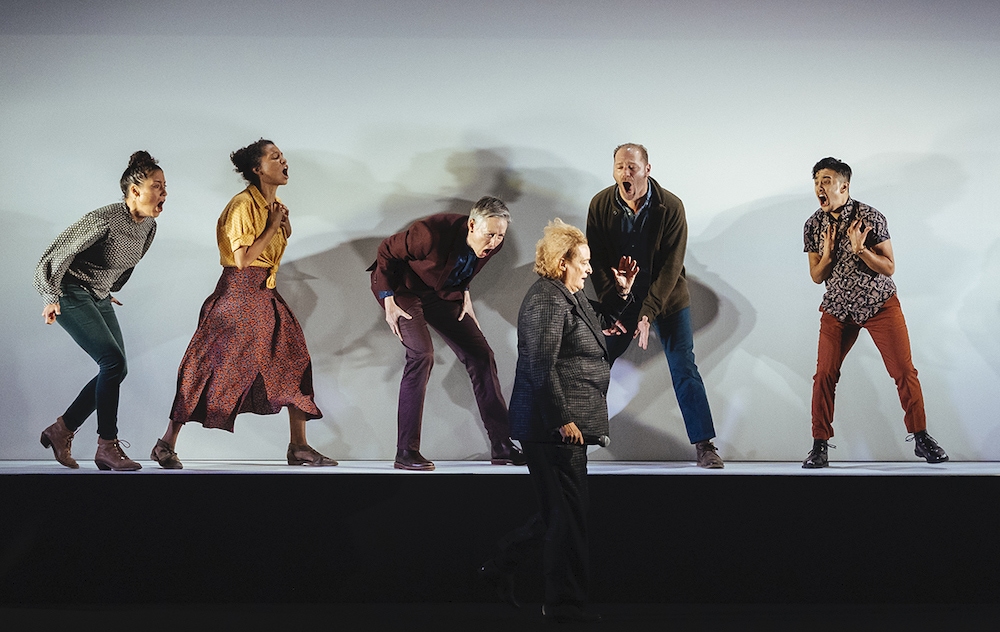
One thing British theater and American theater have in common is that in both there have been instances of inappropriate and abusive behavior by theater practitioners in positions of authority. Some of those instances have been reported; I think most have been ignored. As the top manager of a major theater and as the father of two daughters, how do you see your role and responsibility in the #MeToo era?
My work has always been about creating a feeling of safety in the spaces where I have been the leader. I want all voices to be heard. I want everyone to understand and practice an ethical code of behavior. Simultaneously, it’s about me understanding the EDI structures and guidelines [equality, diversity, and inclusion] on a very concrete policy level, to see whether we are inscribing into the organization practices that protect people in all areas, in all departments.
“Out of the crooked timber of humanity, no straight thing was ever made,” said Immanuel Kant. Our work is to acknowledge that our efforts always need to be refreshed and intensified.
My last question: Going back to the storyline of Everybody, in which the character of Everybody has to give an accounting of how they lived, how would you like your time at Shakespeare Theatre Company to be remembered?
The word exhilaration comes to mind, John. I want this era to be remembered as an era of inescapable engagement for all. I want my time to feel urgent; a call to action.
Thank you.
Thank you; these are some of the most beautiful questions I’ve been asked in an interview. It’s felt like good practice for accounting for myself on the day of judgment!
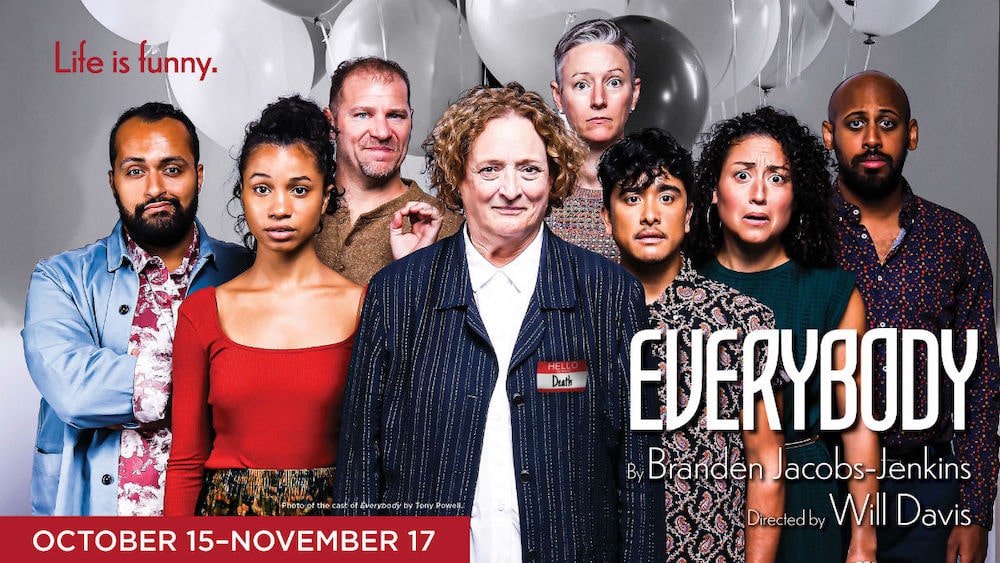
Everybody plays through November 17, 2019 at Shakespeare Theater Company — Lansburgh Theater — 450 7th St NW, Washington, DC 20004. Tickets can be purchased online or at the box office.
Running Time: One hour 45 minutes, with no intermission.





I just saw the Shakespeare Company production of ‘Everyman’ –a major disappointment. Having read this interview, I seriously fear that the Company is slipping into the stereotyped tropes of political correctness. Gender and ethnicity are worth addressing in theater, but I see no original thinking here.